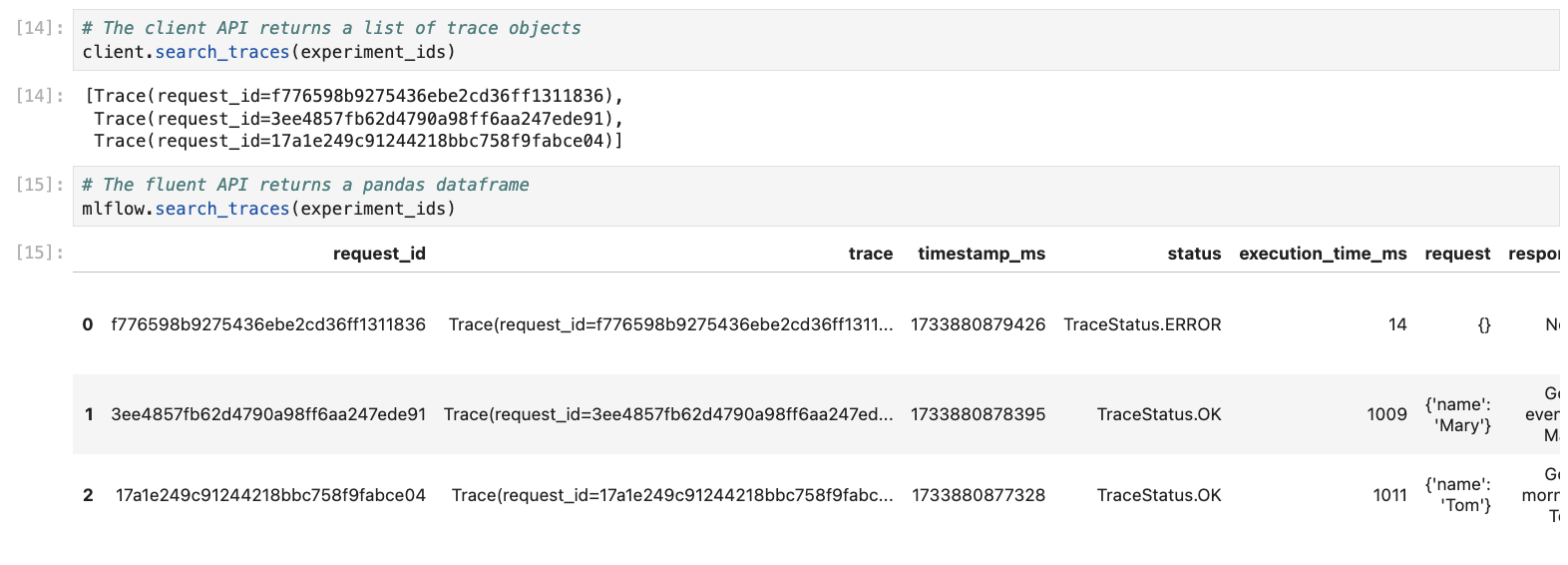Searching and Retrieving Traces
This page describes various ways to search and retrieve traces in MLflow. MLflow provides two methods for this purpose:
MlflowClient.search_traces() and mlflow.search_traces().
MlflowClient.search_traces(): This method allows you to filter traces using experiment IDs, filter strings, and other parameters.mlflow.search_traces(): A higher-level fluent API that returns a pandas DataFrame, with each row representing a trace. It supports the same filtering capabilities as MlflowClient.search_traces and additionally allows you to specify fields to extract from traces. See Extract Specific Fields for details.
The pandas Dataframe returned by the mlflow.search_traces() API consists of the following columns by default:
request_id: A primary identifier of a trace
trace: A trace object.
timestamp_ms: The start time of the trace in milliseconds.
status: The status of the trace.
execution_time_ms: The duration of the trace in milliseconds.
request: The input to the traced logic.
response: The output of the traced logic.
request_metadata: Key-value pairs associated with the trace.
spans: Spans in the trace.
tags: Tags associated with the trace.
Basic Usage of Search Traces
First, create several traces using the following code:
import time
import mlflow
from mlflow.entities import SpanType
# Define methods to be traced
@mlflow.trace(span_type=SpanType.TOOL, attributes={"time": "morning"})
def morning_greeting(name: str):
time.sleep(1)
mlflow.update_current_trace(tags={"person": name})
return f"Good morning {name}."
@mlflow.trace(span_type=SpanType.TOOL, attributes={"time": "evening"})
def evening_greeting(name: str):
time.sleep(1)
mlflow.update_current_trace(tags={"person": name})
return f"Good evening {name}."
@mlflow.trace(span_type=SpanType.TOOL)
def goodbye():
raise Exception("Cannot say goodbye")
# Execute the methods within different experiments
morning_experiment = mlflow.set_experiment("Morning Experiment")
morning_greeting("Tom")
# Get the timestamp in milliseconds
morning_time = int(time.time() * 1000)
evening_experiment = mlflow.set_experiment("Evening Experiment")
experiment_ids = [morning_experiment.experiment_id, evening_experiment.experiment_id]
evening_greeting("Mary")
goodbye()
The code above creates the following traces:
Experiment |
Name |
Tags.person |
Status |
|---|---|---|---|
Morning Experiment |
|
|
|
Evening Experiment |
|
|
|
Evening Experiment |
|
|
|
Then, you can search traces by experiment_ids using either mlflow.search_traces() or
MlflowClient.search_traces().
Note
The experiment_ids parameter is required for MlflowClient.search_traces(),
while it is optional for mlflow.search_traces() and it defaults to the currently active experiment.
from mlflow import MlflowClient
client = MlflowClient()
client.search_traces(experiment_ids=[morning_experiment.experiment_id])
# [Trace #1]
mlflow.search_traces(experiment_ids=[morning_experiment.experiment_id])
# request_id status ... response
# 0 [trace #1 ID] TraceStatus.OK ... Good morning Tom.
Search Traces with filter_string
The filter_string argument provides a flexible way to query traces using a SQL-like Domain-Specific Language (DSL).
The syntax supports searching traces with various metadata and allows for combining multiple conditions.
Filter Traces by Name
Search for traces by the attributes.name keyword:
client.search_traces(
experiment_ids=experiment_ids,
filter_string="attributes.name = 'morning_greeting'",
)
# [Trace #1]
Filter Traces by Timestamp
Search traces created after a specific timestamp:
client.search_traces(
experiment_ids=experiment_ids,
filter_string=f"attributes.timestamp > {morning_time}",
)
# [Trace #2, Trace #3]
Filter Traces by Tags
Filter traces by specific tag values using tag.[tag name]:
client.search_traces(
experiment_ids=experiment_ids,
filter_string="tag.person = 'Tom'",
)
# [Trace #1]
Order Traces
The order_by argument allows you to sort traces based on one or more fields. Each order_by clause follows
the format [attribute name] [ASC or DESC].
client.search_traces(
experiment_ids=experiment_ids,
order_by=["timestamp DESC"],
)
# [Trace #3, Trace #2, Trace #1]
Extract Specific Fields
In addition to the search functionalities mentioned above, the fluent API mlflow.search_traces() enables you
to extract specific fields from traces using the format "span_name.[inputs|outputs]" or
"span_name.[inputs|outputs].field_name". This feature is useful for generating evaluation datasets or analyzing
model performance. Refer to MLFlow LLM Evaluation for more details.
traces = mlflow.search_traces(
extract_fields=["morning_greeting.inputs", "morning_greeting.outputs"],
experiment_ids=[morning_experiment.experiment_id],
)
print(traces)
The output Pandas DataFrame contains the additional columns for the extracted span fields:
request_id ... morning_greeting.inputs morning_greeting.outputs
0 053adf2f5f5e4ad68d432e06e254c8a4 ... {'name': 'Tom'} 'Good morning Tom.'
Lastly, you can convert the pandas DataFrame to the MLflow LLM evaluation dataset format and evaluate your language model.
eval_data = traces.rename(
columns={
"morning_greeting.inputs": "inputs",
"morning_greeting.outputs": "ground_truth",
}
)
results = mlflow.evaluate(
model,
eval_data,
targets="ground_truth",
model_type="question-answering",
)
